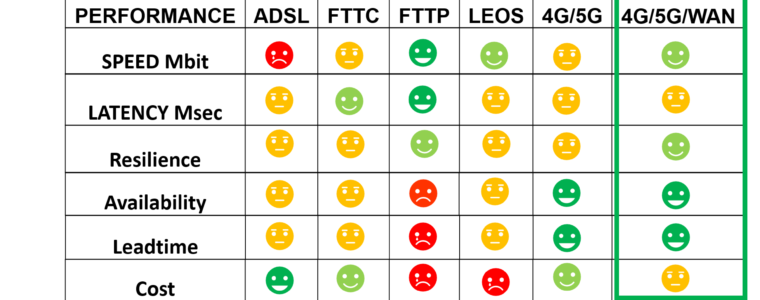
In today’s fast-paced construction environment, reliable internet connectivity is no longer a luxury—it’s a necessity. From real-time project management and remote monitoring to health and safety compliance and digital communications, construction sites demand robust broadband solutions. But what are the options available, and how do they stack up in terms of performance, reliability, and practicality?
The Connectivity Challenge
Construction sites are often located in areas where traditional fixed-line broadband is unavailable or impractical to install. The need for rapid deployment, mobility, and resilience makes conventional solutions like fibre or DSL less viable. This is where alternative technologies come into play.
Broadband Options for Construction Sites
- Fixed Line Broadband
– Strengths: High speed, stable connection, low latency.
– Weaknesses: Long installation times, not feasible for temporary or remote sites, costly setup.
- Satellite Broadband
– Strengths: Global coverage, suitable for extremely remote locations.
– Weaknesses: High latency, weather-dependent, expensive data plans, limited bandwidth.
- 4G/5G Cellular Broadband
– Strengths: Rapid deployment, good speeds (especially with 5G), scalable, mobile.
– Weaknesses: Coverage can vary, performance may degrade with congestion or poor signal.
- Bonded Cellular Solutions (e.g., i-MO 225 5G Router)
– Strengths: Combines multiple cellular connections for higher bandwidth and resilience, supports failover and load balancing, plug-and-play setup, ideal for temporary and mobile sites.
– Weaknesses: Requires multiple SIMs and data plans, initial hardware investment.
Why Bonded Cellular is Leading the Way
The i-MO OptiBond 225 5G router exemplifies the power of bonded cellular technology. Designed specifically for challenging environments like construction sites, it aggregates multiple 4G/5G connections to deliver a single, high-performance broadband link. This ensures uninterrupted connectivity even when individual networks fluctuate or fail.
Key benefits include:
– Instant deployment: No waiting for fixed-line installation.
– Resilience: Seamless failover between networks.
– Security: Built-in VPN support for secure data transmission.
– Flexibility: Available for purchase or rental, with pre-configured setups.
Conclusion
Choosing the right broadband solution for a construction site depends on location, project duration, and connectivity needs. While fixed-line and satellite have their place, bonded cellular solutions like the i-MO 225 offer unmatched flexibility, speed, and reliability—making them the go-to choice for modern construction operations.
